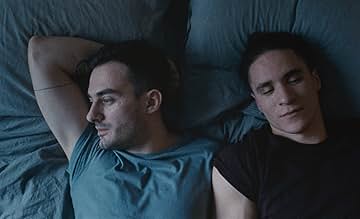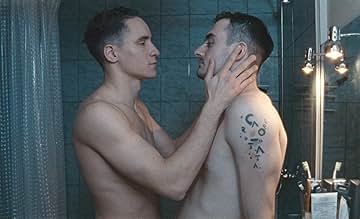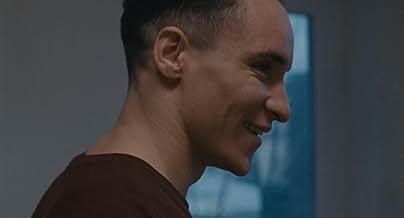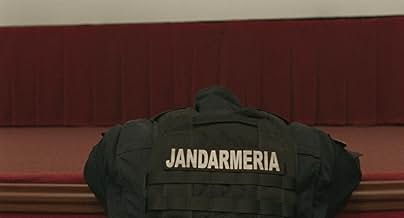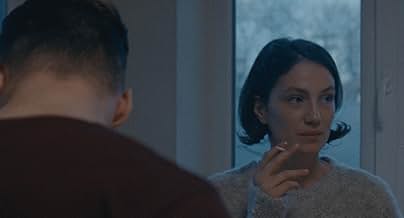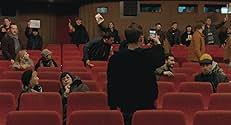ÉVALUATION IMDb
6,1/10
1,6 k
MA NOTE
Cristi, un gendarme roumain, tente de trouver l'équilibre entre deux parties de son identité: celle d'un homme travaillant dans un environnement hiérarchique macho et celle d'un homosexuel q... Tout lireCristi, un gendarme roumain, tente de trouver l'équilibre entre deux parties de son identité: celle d'un homme travaillant dans un environnement hiérarchique macho et celle d'un homosexuel qui essaie de cacher sa vie personnelle.Cristi, un gendarme roumain, tente de trouver l'équilibre entre deux parties de son identité: celle d'un homme travaillant dans un environnement hiérarchique macho et celle d'un homosexuel qui essaie de cacher sa vie personnelle.
- Prix
- 14 victoires et 35 nominations au total
Avis en vedette
The film threatened to be one of those two-parters that quickly slide into boring irrelevance. All the elements were there, the closeted Romanian guy, his Kabylie boyfriend from France and a fleeting visit from a nosey sister who thought her brother was going through a "gay phase".
The two lovers are happy together but there are problems. Hadi wants to go out and about but closeted Cristi wants to keep their relationship, indeed Hadi's existence, under wraps. We are not aware of Cristi's job during the scenes in the flat where the two guys are staying so his reluctance to risk an outing (in both senses of the word) is difficult to understand. Even when the film moves unobtrusively to Cristi's work, we are not sure what it is as the shots showing him do not at first reveal his gendarme uniform.
The unit is going to a cinema whose showing of a film about lesbians has been disrupted by a load of nationalistic god-botherers. Although both the police and the gendarmes try to appear neutral on the surface, when they feel they are not being overheard they make hateful and homophobic statements, Cristi included.
One of the gay guys implies that he will reveal Cristi's orientation leading to a confrontation that is only solved by long negotiations with the cops.
This much is revealed in the storyline provided by IMDB so not a spoiler.
Cristi feels that this is a disaster and we watch his feeling of doomed terror for the rest of the film.
The cleverness of the film was to concentrate on the dynamic at work rather than that of the relationship. Relationship films have been done to death. However, films whose gay characters interact in a macho and illiberal environment such as the police or gendarmerie have not.
Conrad Mericoffer played a good role as Cristi, a man who senses that his life is spinning out of control. He well portrayed the increasing desperation of the character needing to know the results of the confrontation. He was convincing in the earlier, tender scenes with lover Hadi and just as real in his role as macho man conforming to canteen culture.
The film was a compact eighty minutes long and was just right. We are left with a final comment from his boss that might mean something or might not. Had all the cover up that Cristi had maintained over his life at work been rent away? We shall never know.
The two lovers are happy together but there are problems. Hadi wants to go out and about but closeted Cristi wants to keep their relationship, indeed Hadi's existence, under wraps. We are not aware of Cristi's job during the scenes in the flat where the two guys are staying so his reluctance to risk an outing (in both senses of the word) is difficult to understand. Even when the film moves unobtrusively to Cristi's work, we are not sure what it is as the shots showing him do not at first reveal his gendarme uniform.
The unit is going to a cinema whose showing of a film about lesbians has been disrupted by a load of nationalistic god-botherers. Although both the police and the gendarmes try to appear neutral on the surface, when they feel they are not being overheard they make hateful and homophobic statements, Cristi included.
One of the gay guys implies that he will reveal Cristi's orientation leading to a confrontation that is only solved by long negotiations with the cops.
This much is revealed in the storyline provided by IMDB so not a spoiler.
Cristi feels that this is a disaster and we watch his feeling of doomed terror for the rest of the film.
The cleverness of the film was to concentrate on the dynamic at work rather than that of the relationship. Relationship films have been done to death. However, films whose gay characters interact in a macho and illiberal environment such as the police or gendarmerie have not.
Conrad Mericoffer played a good role as Cristi, a man who senses that his life is spinning out of control. He well portrayed the increasing desperation of the character needing to know the results of the confrontation. He was convincing in the earlier, tender scenes with lover Hadi and just as real in his role as macho man conforming to canteen culture.
The film was a compact eighty minutes long and was just right. We are left with a final comment from his boss that might mean something or might not. Had all the cover up that Cristi had maintained over his life at work been rent away? We shall never know.
This is a brave and poignant movie. It is very simple in its pace and setting and could easily be set for a play.
We know from Polish and Georgian movies that it's very complicated to be openly gay in Eastern European countries. Poppy Field is another illustration of this fact.
Cristi is no hero and no victim. As many closeted gay men, he is caught up in his contradictions and spends a lot of time and energy lying to himself and to the others around him. But you can only maintain the façade for so long, and then cracks start to show. The path to authenticity seems like a crucifixion, and the homophobia expressed in the movie is closely associated with Christianism.
My favorite scene is when Cristi is left alone in a red, empty movie theater. We can feel the tempest going on in his skull. His career, his privacy, his life are all at stakes in one day.
A great movie about resilience, bad faith, and sexual minorities.
We know from Polish and Georgian movies that it's very complicated to be openly gay in Eastern European countries. Poppy Field is another illustration of this fact.
Cristi is no hero and no victim. As many closeted gay men, he is caught up in his contradictions and spends a lot of time and energy lying to himself and to the others around him. But you can only maintain the façade for so long, and then cracks start to show. The path to authenticity seems like a crucifixion, and the homophobia expressed in the movie is closely associated with Christianism.
My favorite scene is when Cristi is left alone in a red, empty movie theater. We can feel the tempest going on in his skull. His career, his privacy, his life are all at stakes in one day.
A great movie about resilience, bad faith, and sexual minorities.
It is scary to see the Romanian reality that some of us know so well displayed on screen in such strong tones. For me, being a victim of a similar assault as portrayed in the movie, it was familiar and disturbing, at the same time. I commend the creators of this movie for their courage. The Romanian society still is exactly as we see it on screen.
Cristi's foreign boyfriend has just dropped in, but Cristi has to go to work as a member of the Romanian "military" police. His team is called on to help with a situation where protestors have stopped the screening of a lesbian film. He hits one person who threatened to out him, and half the film is Cristi interacting with various other individual officers keeping him away from the main crowd and the complainant.
This is a portrait of the police force, its masculine-homophobic culture, and how Cristi adapts to it. However, I would like more action of some sort, rather than all the chatter. I was mildly irritated that the opening boyfriend segment of the film was basically used to establish that Cristi was gay, while the boyfriend's being a Muslim just seems to be an irrelevancy.
This is a portrait of the police force, its masculine-homophobic culture, and how Cristi adapts to it. However, I would like more action of some sort, rather than all the chatter. I was mildly irritated that the opening boyfriend segment of the film was basically used to establish that Cristi was gay, while the boyfriend's being a Muslim just seems to be an irrelevancy.
Great portrayal of a day and a night in the life of Cristi, a gendarme of Bucharest. The acting of the main actor Conrad Mericoffer, as well as that of the other policemen is one of truly high quality. On the contrary, except for the scene with the sister, I did not appreciate particularly Radouan Leflahi's (Hadi) performance, although the dialogues were written with accuracy, especially in their attempt to reproduce the silly "empty" talk of two lovers (coming from different countries).
The first part is to be appreciated also for the way in which the contrast between the two different mindsets of the protagonists are described. On the one hand Hadi, who quite naively fails to understand the complexity of the world Cristi lives in, and, on the other hand, Cristi, who shows a maybe too cautious attitude towards life, discretion and circumspection being his mottos.
The second part of the movie is absolutely worth watching: the anxiety Cristi feels while being kept out from the discussion going on outside the film theatre is conveyed through some quite long takes, during which Cristi's emotions hit him like waves, alternatively calming down and taking over again. The - partially unjustified - terror of losing his place in his comfort zone leads Cristi to commit an act of violence, the consequences of which will be dealt with by the fellow gendarmes with typical mafiaesque methods.
Much worthier watching than the (only superficially) German equivalent "Freier Fall".
The first part is to be appreciated also for the way in which the contrast between the two different mindsets of the protagonists are described. On the one hand Hadi, who quite naively fails to understand the complexity of the world Cristi lives in, and, on the other hand, Cristi, who shows a maybe too cautious attitude towards life, discretion and circumspection being his mottos.
The second part of the movie is absolutely worth watching: the anxiety Cristi feels while being kept out from the discussion going on outside the film theatre is conveyed through some quite long takes, during which Cristi's emotions hit him like waves, alternatively calming down and taking over again. The - partially unjustified - terror of losing his place in his comfort zone leads Cristi to commit an act of violence, the consequences of which will be dealt with by the fellow gendarmes with typical mafiaesque methods.
Much worthier watching than the (only superficially) German equivalent "Freier Fall".
Le saviez-vous
- AnecdotesFirst film by the actor Eugen Jebeleanu.
Meilleurs choix
Connectez-vous pour évaluer et surveiller les recommandations personnalisées
- How long is Poppy Field?Propulsé par Alexa
Détails
Box-office
- Budget
- 932 000 € (estimation)
- Durée1 heure 21 minutes
- Couleur
- Mixage
- Rapport de forme
- 1.85 : 1
Contribuer à cette page
Suggérer une modification ou ajouter du contenu manquant

Lacune principale
By what name was Poppy Field (2020) officially released in India in English?
Répondre



